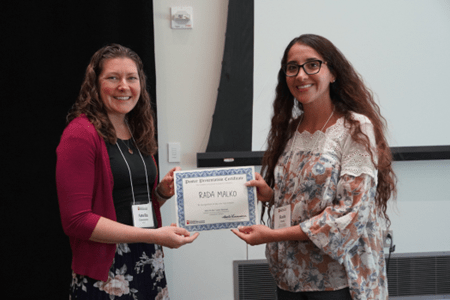Rada Malko is a fifth-year Medical Scientist Training Program (MSTP) student in the Department of Medical and Molecular Genetics at the Indiana University School of Medicine. Her research, conducted with the Pollok laboratory at the Herman B Wells Center for Pediatric Research and IU Melvin and Bren Simon Comprehensive Cancer Center, seeks to improve existing treatments for sarcoma, a rare cancer that arises in soft tissue and bones. She focuses on targeting abnormal signaling pathways to develop novel therapies for treating and managing pediatric sarcomas.
However, her path to success was not straightforward. It was marked by resilience and an unwavering commitment to overcome adversity from a young age.
In 1999, when Malko was only 3 years old, her family fled from Iran to the United States to seek safety from religious persecution. They sold everything, packed one suitcase and headed to Chicago. While grateful to escape hostility, their arrival brought new challenges, including financial burdens and language barriers.
Without their high school diplomas, Malko’s parents worked tirelessly to secure the best jobs they could to support the family, which included Malko, her little brother, and their grandparents. Both parents consistently held three jobs, with her father’s primary role being at a manufacturing company and her mother’s primary role being at Walmart, where she worked hard to get promoted.
“We had a roof over our head, and that's great, but we didn't really have food in the fridge, you couldn't really go to the pool, and if a library book was a day late, we didn't have the 10 cents for the fine,” Malko recalled of her childhood.
By the time Malko was 10 years old, she had been in public school long enough to speak English better than her parents, who struggled to find resources to learn. Despite her young age, she often served as the family’s unofficial interpreter and assisted her parents with financial matters.
She especially had to step up for her family in high school when her father was hospitalized for three months after a severe accident. Malko made frequent visits to the hospital to help translate for her father and communicate with the doctors. These visits, however, exposed her to the shortcomings of the healthcare system. She often felt their doctors lacked empathy, particularly toward immigrant families, which left her initially skeptical.
“As an immigrant, you're not really put with the best doctors,” Malko explained. “All the refugees go to the one doctor, the ‘Refugee Doctor’ and, unfortunately, they seemed to hate their job.”
Thankfully her father recovered, but his inability to work resulted in immense financial strain on the family. The medical bills started to pile up along with growing credit card debt. To make matters worse, it was 2008, during the financial crisis, and their family home was draining nearly every penny they owned.
Malko, who was 17 at the time, took charge of the family situation and figured out how to refinance the family home, consolidate the credit card debt and take care of the medical bills. Malko recalled going to the accountants and showing them her mother’s pay stubs to explain how they could not afford what was being demanded of them.
“It was a lot of reaching out to people and talking about our family situation in order to get the help we needed,” Malko shared.
However, balancing these challenges with her schoolwork proved difficult, and her once good grades started to slip.
Despite this, Malko's determination never wavered. She excelled in her AP exams, scoring 5s across the board. Her high school faculty questioned her AP scores due to her semester grades, even suggesting that she shouldn't pursue college. But, Malko didn’t let that hold her back.
Discovering a talent in science
In 2014, Malko enrolled at North Park University in Chicago, a nearby college so that she could stay close to home. Though she didn’t initially know which career path she wanted to follow, she discovered her talent for research during her sophomore year, thanks to an inspiring organic chemistry professor. Recognizing Malko’s talent, the professor encouraged her to apply for a research internship over the summer.
During this internship, Malko worked on two impactful research projects. She was inspired by the rising popularity of health and dietary supplements and their lack of accurate labeling for contents such as omega-3 and omega-6 fatty acids. One study evaluated the accuracy of labels on various fish oil brands and was published in the Journal of the American Oil Chemists' Society. The other study compared the fatty acid content of various cooking oils and was published in the Journal of Chemical Education. These studies were crucial in helping her and her team better understand the diversity of fatty acid composition across various products and brands to assess their potential health impacts. This project was later incorporated into an advanced instrumental chemistry class curriculum for two years, enhancing students’ understanding of real-world applications.
These experiences not only solidified Malko’s interest in scientific research but also introduced her to the possibility of contributing to meaningful scientific advancements.
Motivation for medicine
Malko’s view of the healthcare system shifted during her freshman year of college when her mother was re-diagnosed with cervical cancer. Accompanying her mother to appointments, Malko again found herself acting as an interpreter and advocate. However, unlike her earlier experiences, her mother’s oncologist and his team treated her mother with genuine, compassionate care.
“That’s what really opened up my world to the idea that doctors can really care about their patients,” Malko stated. “That’s when I thought to myself, ‘Could I be like them?’”
Malko was inspired by this doctor and his team but she had found her talent for scientific research. So, how did she decide which career path to take? Well, she didn’t. She decided to do both.
Why IU School of Medicine?
Although Malko was accepted into several other graduate programs, the IU School of Medicine was her first choice for many reasons.
It is one of the few schools in the country that offers the MSTP program. This dual MD/PhD program allows students to integrate medical and research training over eight years, with tuition and a stipend fully funded through the National Institutes of Health (NIH).
Malko was also particularly drawn to IU’s precision medicine program, which tailors treatments based on a patient's unique genetics, lifestyle and environment, rather than a “one-size-fits-all” approach. This approach aligns with her mission of providing the best care possible for her patients.
Her decision was also deeply influenced by witnessing the life-saving work at Riley Children’s Health, an IU School of Medicine affiliate.
"My husband's little brother was diagnosed with an incredibly rare brain cancer when he was 15, a type that almost never happens in children and has an exceptionally high mortality rate," Malko explained. "They went to many different places, and no one had seen anything like it before. Then they went to Riley, where he had surgery and a few months of radiation. Now, he's 10 years in remission."
Current research
Malko’s current research focuses on improving the life expectancy for children diagnosed with osteosarcoma, a type of bone cancer with a poor prognosis. The current standard treatment often involves multiple rounds of chemotherapy, but the five-year survival rate remains around 65%.
A significant challenge in treating osteosarcoma is its tendency to metastasize, or spread, from the bone to lungs. This late-stage discovery often results in a high tumor burden, limiting treatment options and leading to patient mortality.
In the Pollok lab, Malko is investigating a drug combination therapy involving cyclin-dependent kinase (CDK) inhibitors and bromodomain and extra-terminal motif (BET) inhibitors. Preliminary findings suggest this combination effectively reduces cancer cell growth while minimizing drug resistance and toxicity. By targeting specific cell cycle dysregulation, Malko’s research embodies the principles of precision medicine, aiming to tailor treatments to each patient’s unique cancer profile.
Although she is still in the education and training phase of her career, Malko has already received numerous awards and grants for her research. Recent ones include:
- A T32 award from the Pediatric and Adult Translational Cancer Drug Discovery and Development Training Program (PACT-D3) in October of 2024.
- An award for her poster at the Wells Center Retreat in September of 2024.
- A 2nd place award for her poster in translational research for Cancer Research Day at IU Simon Comprehensive Cancer Center in May of 2024.
- Multiple travel grants from the IU Simon Comprehensive Cancer Center, NIH and the Jack Bauer Honor Fund to present her research at the American Association for Cancer Research (AACR) Annual Meeting in San Diego in April of 2024.
- A pilot grant from IU Simon Comprehensive Cancer Center in January of 2023
Support and mentorship
Malko credited her mentor in the lab, Karen Pollok, PhD, the Caroline Symmes Professor of Pediatric Cancer Research, for fostering her independence and confidence in research.
“From the first day we met, we clicked,” Malko shared.
Pollok’s approach allows Malko to take ownership of her research while still providing guidance when needed.
“She is building great scientists in my opinion,” Malko stated proudly.
Pollok was equally impressed with Malko’s dedication and contributions.
“Someone like Rada doesn’t come around often; she can balance her work with her personal life so well,” Pollok shared. “What I like most about her is that she has such a great work ethic combined with a curiosity about her science. She’s very good at looking at different ways to analyze her data and bringing new ideas to the project– and that is so important whether you’re going to be a scientist, a clinician or a little of both.”
Looking ahead
After completing the MSTP program, Malko plans to return to Chicago for her residency in primary care. This path will better allow her to serve diverse communities, including immigrant families. Plus, she will get to be close to her family again. 
"I’ll be able to impact a broader population through primary care," Malko shared. "It will allow me to work in different communities and create a broader, more meaningful change– the reason why I even started all of this."
From navigating the challenges of immigration and financial hardship at a young age to excelling in science and medicine, Malko is a testament to human resilience and determination. She is dedicated to making a difference through her research and compassionate care to restore her patients’ hope in the healthcare system.
